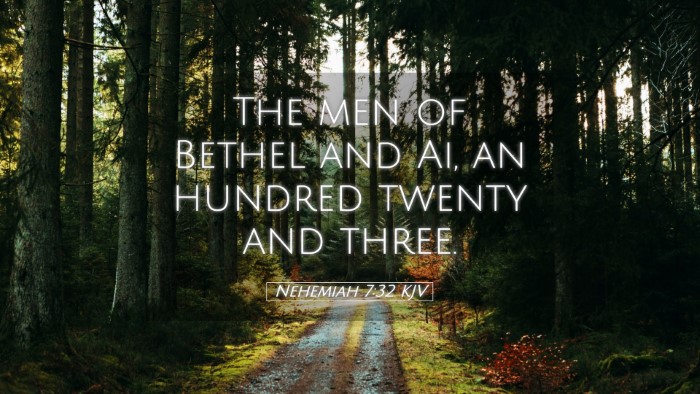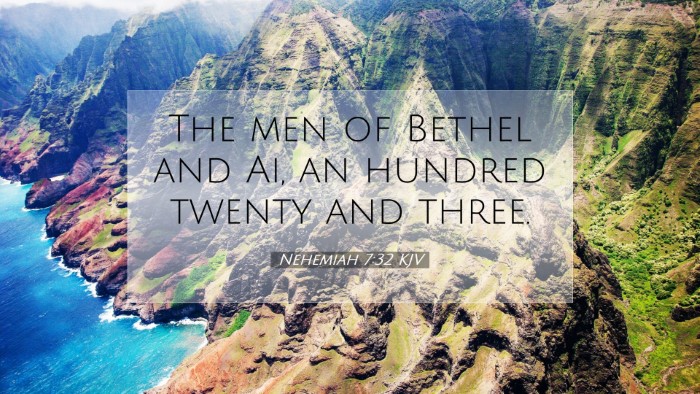Commentary on Nehemiah 7:32
Bible Verse: Nehemiah 7:32 - "The men of Benjamin: Salu the son of Meshullam, the son of Joed, the son of Pedaiah."
Background and Context
The book of Nehemiah is a critical historical narrative that focuses on the restoration of Jerusalem's walls and the re-establishment of the Jewish community post-exile. Chapter 7 serves as a record of the genealogical and administrative structure of the returning exiles, emphasizing the importance of lineage, identity, and the reaffirmation of their covenantal community with God.
In this context, the mention of the tribe of Benjamin, and specifically Salu son of Meshullam, delineates the individuals who played vital roles in this restoration process. Understanding this verse necessitates a consideration of its relevance to the broader narrative of reconstruction and faith renewal among the Israelites.
Insights from Public Domain Commentaries
Matthew Henry
Matthew Henry highlights the significance of the genealogies present in Nehemiah as a foundation for the emerging community. He points out that the mention of specific names, such as Salu, creates a sense of continuity and belonging for the people of Israel. Henry discusses how the listing of names serves to preserve the memory of those who returned from exile and affirms their right to inherit the land.
Moreover, he observes that these genealogies are not merely historical records; they reflect the faithfulness of God throughout generations. Henry encourages readers to recognize that God's promise to Israel persists through the lineage of these individuals, underscoring a key theme of covenant faithfulness which is central to the Old Testament narrative.
Albert Barnes
Albert Barnes provides a detailed examination of the genealogical listings in Nehemiah. He notes the importance of the tribe of Benjamin as one of the smallest yet significant tribes who returned to Jerusalem. Barnes emphasizes that genealogies were essential for claiming land and privileges in ancient Israel, thereby linking the spiritual and physical aspects of the land to the identity of its inhabitants.
Furthermore, Barnes elucidates the role of individuals like Salu, which mirrors the greater leadership and community restoration efforts initiated by Nehemiah. He stresses the necessity of strong leaders and families within the returning exiles to foster spiritual revival and rebuilding, capturing the essence of communal responsibility in the re-establishment of Jerusalem.
Adam Clarke
Adam Clarke approaches this verse with a focus on the theological implications of the names listed. He posits that each name in these genealogies has a purpose that contributes to the unfolding narrative of redemption. Clarke suggests that the name Salu, meaning "peace" or "tranquility," symbolically represents the hope and restoration intended for the nation of Israel.
Clarke also comments on the historical significance of the tribe of Benjamin, reminding readers that this tribe produced notable figures in Israelite history, including King Saul. He reflects on how the rise of new leaders from Benjamin, including those mentioned in Nehemiah, signals a new beginning and hope for the future of Israel amid a backdrop of past struggles and disobedience.
Theological Implications
Through the lens of Nehemiah 7:32, several theological themes emerge that inspire pastors, students, and scholars alike. Firstly, the theme of hope and restoration is profound. The chronicling of names and families points towards a God who not only remembers His people but actively restores them to their intended purpose and identity.
Secondly, the importance of community is highlighted. Each individual's return and participation in the rebuilding process serve to reinforce the collective identity of the Israelites. Thus, the church today can draw parallels from this passage, understanding that each member plays a unique role in the body of Christ, contributing to the shared mission of evangelism and discipleship.
Additionally, the weight of heritage and legacy crystallized in this verse challenges modern readers to consider their spiritual lineage. Much like the Israelites, believers today are part of a larger historical and spiritual continuum that connects them to the promises of God.
Encouragement for Current Ministries
For pastors and ministry leaders, Nehemiah 7:32 serves as an encouragement to value the contributions of individuals within their congregations. Portfolios of people, much like those listed in Nehemiah, can help churches build a legacy of faith that engages with the present while looking ahead to the future. The church is called to embrace and empower each member, recognizing their God-given purpose within the community.
For students and scholars of theology, this verse and the broader surrounding text offer a rich ground for exploring notions of identity, community, and continuity in God’s plan. Engaging with the historical context and theological implications can deepen understanding, invigorating personal faith and academic inquiry.
Conclusion
In summary, Nehemiah 7:32 encompasses layers of meaning spanning historical, theological, and practical applications. It challenges readers to recognize the importance of their heritage, the value of their contributions within a community, and the faithfulness of God to His promises. As believers reflect on these themes, they are encouraged to participate actively in God's ongoing work of restoration and renewal in their contexts, much like their ancestors in Nehemiah's time.


